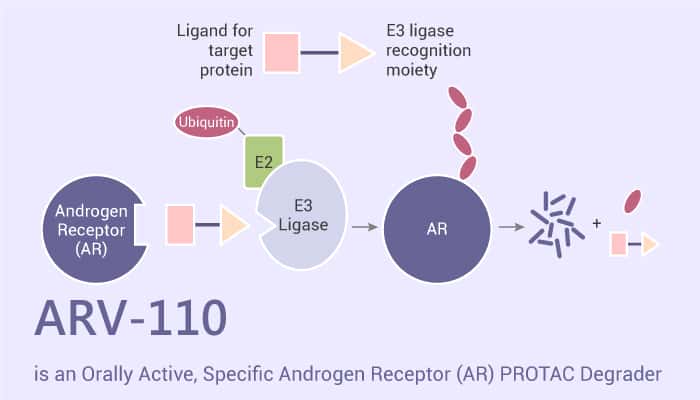Proteolysis targeting chimeras also names PROTAC protein degraders. PROTACs are emerging as an excellent class of small molecule therapies for cancer and other diseases. As we all know, conventional inhibitors or antagonists usually block the enzymatic or signaling activity of target proteins.
PROTACs harness a system present within every cell and clear away damaged or unwanted proteins. One end of the PROTAC selectively binds the target protein, and the other end binds an E3 ubiquitin ligase.
Besides, PROTACs are becoming a novel mode of action for small molecule therapies in cancer or other diseases. Firstly, PROTAC molecules do not need to bind a target protein’s active site. Second, PROTAC molecules are not degraded or consumed by the process of their triggers.
In this article, we will introduce an orally active, specific androgen receptor (AR) PROTAC degrader, ARV-110.

ARV-110 completely degrades AR in all cell lines tested, with an observed 50% degradation concentration (DC50) < 1 nM. Additionally, At the dose of 0.01 nM-300 nM, ARV-110 leads to AR degradation in LNCaP cells in a dose-dependent manner. In VCaP cells, ARV-110 leads to AR degradation in a time-dependent manner.
Additionally, ARV-110 suppresses the expression of the AR-target gene PSA. It inhibits AR-dependent cell proliferation and induces apoptosis at low nanomolar concentrations. Besides, ARV-110 degrades clinically relevant mutant AR proteins (WT AR, F876L, T877A, M896V, and H874V). And it retains activity even in a high androgen environment (R1881, 100 nM) in VCaP cells.
In LNCaP, VCaP, and prostate cancer patient-derived xenograft (PDX) models, ARV-110 exhibits a greater than 90% AR degradation. What’s more, ARV-110 exhibits significant inhibition of tumor growth and AR signaling in vivo. ARV-110 demonstrates in vivo efficacy and reduction of AR-target gene expression in a long-term, castrate, enzalutamide-resistant VCaP tumor model. And the TGIs are 70% and 60% for 3 mpk and 10 mpk dosage. Respectively.
In conclusion, ARV-110, as a specific androgen receptor (AR) PROTAC degrader, exhibiting a promising future for prostate cancer research.
Reference:
[1]. Taavi Neklesa, et al. 2018. 78 (13): pp. 5236.